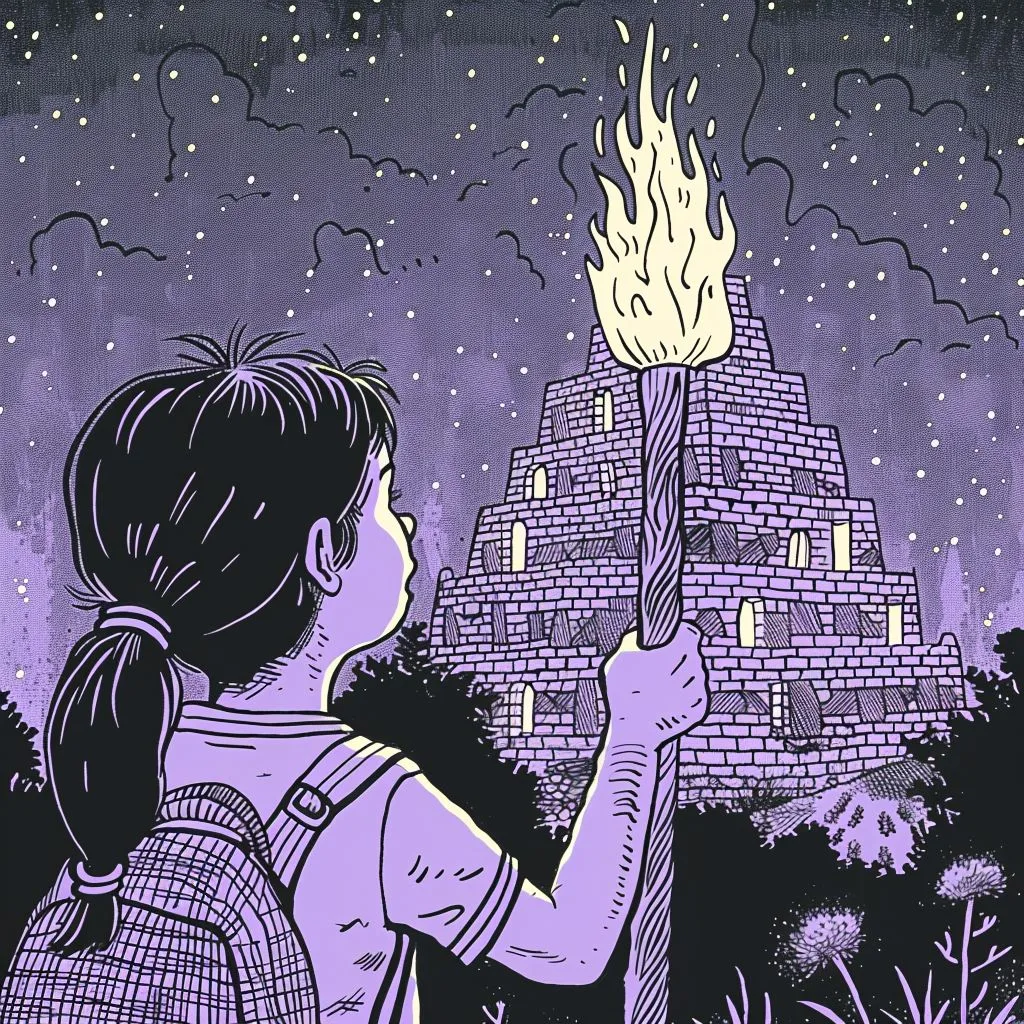Greetings, language explorers and lovers of the esoteric! Prepare to step into a realm where words weave magic and every term harbors a world of meaning yet to be uncovered.
Dive into a universe where mysterious terms like “zhaghzhagh,” “tingo,” and “epibreren” await to reveal their secrets through whimsical tales and intriguing origins. Each word is not merely a term but a portal into a distinct cultural phenomenon or a quirky human behavior that highlights the creativity and diversity of language across cultures.
This isn’t just a tour— it is a celebration of linguistic wonders, a carnival where each unique word invites you to delve deeper into its story, unlocking new perspectives and hidden meanings. Here, words are more than sounds or symbols; they are vibrant expressions of human life and creativity.
So, fasten your lexical seat belts, sharpen your curiosity, and prepare to explore the splendid panorama of words that reveal as much about the human experience as they delight the imagination. Join us as we unravel the enchanting and sometimes humorous realities encapsulated in these global gems.
1. Tartle
Tartle is a quirky and uniquely Scottish term that might not have a direct translation in many languages, but it captures a common human experience with delightful precision.
This term describes the moment of hesitation when introducing someone but momentarily forgetting their name. It’s that awkward pause, a mental scramble, that occurs just as you’re about to say the person’s name—a universal experience that now has a name in Scots!
Imagine you’re at a gathering, weaving through groups of friends and acquaintances, and you pull someone into the conversation. Just as you turn to introduce them, your mind blanks. This, precisely, is tartle. It’s a common faux pas that can cause a blush or two but is generally met with good-natured laughter and understanding.
The origin of “tartle” is somewhat elusive, embedded deeply within the Scots language. It’s a term that reflects the endearing and human side of social interactions, showcasing that sometimes, even the simplest things, like remembering a name, can momentarily elude us.
While you might not use “tartle” in everyday conversation outside of Scotland, it’s a handy term to know. Next time this happens to you, you’ll have the perfect word to describe that brief moment of panic. Not only does it offer a way to save face with humor, but it also enriches your linguistic arsenal.
Have you ever had a moment of tartle? Next time it happens, remember that you’re not alone in this amusing lapse. It’s a shared human moment that connects us all in our imperfections and vulnerability.
IPA: /ˈtɑːrtl/
Sample Sentence: At the party, I felt a brief tartle before triumphantly recalling her name, much to the amusement of our mutual friends.
2. Zhaghzhagh
Zhaghzhagh is a Persian word that vividly captures the sensation of chattering teeth due to extreme cold. This term evokes a physical reaction and immerses you in the visceral experience of bone-chilling weather. Interestingly, “zhaghzhagh” is an onomatopoeia, a word that phonetically imitates, resembles, or suggests the sound that it describes. In this case, it mimics the sound of teeth clattering together from the cold.
Imagine standing outside on a frosty morning, the air so cold that every breath feels like inhaling shards of ice. As the temperature dips further, your body reacts instinctively—your teeth begin to clack together uncontrollably. This is the essence of zhaghzhagh, which sounds almost like the very action it describes, making it a perfect example of onomatopoeia.
Originating from the Persian language, zhaghzhagh reflects the climates of Iran’s varied geography, from snowy mountain peaks to frigid desert nights. It’s a word that has been used for centuries, illustrating the cultural significance of describing the physical sensations brought on by the cold.
When you use zhaghzhagh, you do more than just describe a physical state; you evoke an atmosphere of warmth and camaraderie in gathering together to find refuge from the cold. It’s about experiencing and overcoming the harshness of winter and reminds us of the warmth of human connection that can help mitigate the cold’s bite.
So, next time you’re wrapped up during a cold snap, remember zhaghzhagh. This word doesn’t just describe your physical reaction to the cold and connects you to a centuries-old tradition of weathering the cold together.
IPA: /ʒɑːɡˈʒɑːɡ/
Sample Sentence: As we stepped out into the blizzard, the zhaghzhagh of our teeth was the only sound audible over the howling wind.
3. Pochemuchka
Pochemuchka is a Russian term for someone who asks many questions, often a child. If you’ve ever encountered a curious kid whose every other word is “why?” You’ve met a real-life pochemuchka. This word describes the insatiable curiosity that drives incessant questioning.
Imagine yourself at a family gathering or a public event surrounded by young minds eager to understand the world. Among them, there’s likely a pochemuchka, persistently probing into the workings of everything with a relentless stream of “why?”, “what?”, and “how?” questions. This term is affectionate yet exasperated, capturing both the admiration for the child’s curiosity and the weariness of those answering the barrage of inquiries.
The origin of “pochemuchka” lies in the Russian word “pochemu,” which means “why.” It reflects a cultural appreciation for inquisitiveness and education, highlighting the importance of questioning to learn and grow. This term emphasizes the value placed on intellectual development from a young age in Russian-speaking communities.
When you engage with a pochemuchka, you’re not just answering questions but helping shape a keen mind. Embrace these interactions as opportunities to educate and inspire. You may find yourself rediscovering the world through fresh, inquisitive eyes.
So, have you ever been a pochemuchka, or do you know one? Cherish the curiosity—it’s a gateway to endless learning and discovery.
IPA: /pɒˈtʃɛmʊtʃkə/
Sample Sentence: At the museum, the little pochemuchka in our group kept the guide on her toes with his endless questions about dinosaurs.
4. Kaapshljmurslis
Kaapshljmurslis is a Latvian term that vividly describes the discomfort of being cramped while riding public transportation during rush hours. This word perfectly captures the all-too-familiar squeeze of being packed into a bus or train with little room to maneuver, a daily reality for many commuters.
Imagine yourself on a busy morning commute: in a crowded bus or train, bodies pressed together, every inch of space occupied. As you hold onto a strap or rail for stability, trying to maintain your balance as the vehicle sways and jolts, you experience kaapshljmurslis—a state of physical constraint that almost every urban commuter can relate to.
The origin of “kaapshljmurslis” reflects the practical and often challenging aspects of city living, particularly the daily interactions with public transport systems. It underscores the physical and sometimes emotional toll such conditions can impose on individuals, highlighting a common urban experience that resonates with many worldwide.
Kaapshljmurslis is more than just a physical experience; it also encompasses the shared endurance and unspoken camaraderie among passengers who navigate this daily challenge together. It serves as a reminder of the resilience required in urban life and the unexpected interactions that can occur in these compressed spaces.
Next time you find yourself in a kaapshljmurslis situation, remember that this term not only describes your physical state but also connects you with the collective experience of city dwellers everywhere. It’s a small but meaningful nod to the challenges and interactions that shape our daily lives in the urban jungle.
IPA: /ˈkaːpʃʎʊrslis/
Sample Sentence: Every morning, he braced himself for the inevitable kaapshljmurslis on the subway as he squeezed onto the crowded train.
5. Dysania
Dysania is a contemporary term that refers to difficulty getting out of bed in the morning. It goes beyond the typical grogginess most people feel; it’s a chronic struggle, often linked to clinical issues like depression or chronic fatigue syndrome.
Imagine it’s early morning, your alarm rings, and instead of bounding out of bed, you feel an overwhelming dread at the thought of moving. The comfort of your blankets seems like the only place you can be. This isn’t just laziness or a desire for five more minutes of sleep—it’s dysania, a profound difficulty in starting the day due to physical or psychological barriers.
The origin of “dysania” is relatively modern and is not as deeply rooted in linguistic tradition as other words. It derives from the prefix “dys-” meaning bad or difficult, and “ania,” possibly from the Greek “ania” meaning distress or trouble. This term has gained more recognition with increasing awareness about mental health and the impacts of sleep on overall well-being.
When discussing dysania, it’s important to approach it with sensitivity and understanding, recognizing it as a sign that someone might need support or medical attention, rather than simply viewing it as laziness or a minor issue.
If you ever experience dysania, consider it a sign to check in with yourself. It might be a cue that your body is asking for help, whether it’s a need for more rest or possibly a deeper health inquiry.
So, next time you find it almost impossible to leave your cozy cocoon in the morning, remember the term dysania. You’re not alone in this experience, and it might be worth exploring what your mind and body are telling you.
IPA: /dɪˈseɪniə/
Sample Sentence: After a week of feeling an intense struggle every morning, she realized that what she was experiencing was not just typical sleepiness but dysania, prompting her to seek professional advice.
6. Pluviophile
A pluviophile finds joy and peace of mind during rainy days. Unlike the more common reaction of gloom associated with rainy weather, pluviophiles revel in the wetness and the comforting sounds of raindrops pattering against the windows.
Imagine sitting by a window, a book in hand, as rain gently taps against the glass. The world outside is a wash of grey and vibrant green, and you feel a profound sense of calm and contentment enveloping you. This is the pluviophile’s ideal setting—a moment of solitude and reflection powered by the rhythmic sound of rainfall.
The term “pluviophile” comes from the Latin “pluvial,” which means rain, and “phile,” a suffix meaning lover of. It’s a relatively modern term that connects the emotional and aesthetic pleasures derived from rainy environments. It reflects a growing awareness and appreciation of the different moods of nature and how these can resonate with individual temperaments.
For pluviophiles, rain is not just a meteorological phenomenon but a mood-enhancing backdrop that provides a respite from the sunny, bustling days. It’s a natural setting that invites introspection and creativity, often leading to moments of significant artistic and philosophical inspiration.
Next time the skies grey and the rain falls, if you find yourself feeling unusually at peace, you might just be a pluviophile. It’s a perfect opportunity to indulge in the tranquil ambiance, perhaps with a cup of tea and a good book, and let the soothing sounds of nature rejuvenate your spirit.
IPA: /ˈpluː.vi.ə.faɪl/
Sample Sentence: The gentle hum of the rainstorm outside was music to the ears of the pluviophile, who felt an inexplicable sense of calm as the world turned lush and vibrant under the watery veil.
7. Sturmfrei
Sturmfrei is a German term that describes the freedom one feels when one has the house to themselves, particularly when parents or roommates are away. This word captures the delightful sense of liberation and privacy one experiences when alone in one’s living space.
Imagine this: your housemates are out for the evening or perhaps on a trip, and suddenly, the space is all yours. You can play music as loudly as you like, dance in the living room, or lounge in pajamas all day without a single interruption. This is sturmfrei—the freedom to be utterly yourself in your own space without any need to adjust your behavior for others.
The origin of “sturmfrei” is quite literal from German: “Sturm” means storm, and “frei” means free. It implies a space that is free from the storms of everyday family or communal life. It’s a term that reflects both a physical and emotional clearing, suggesting a break from the usual household dynamics.
Sturmfrei isn’t just about solitude; it’s about self-expression and indulgence in personal freedom. It provides a rare opportunity to engage in activities you might normally restrain yourself from doing, offering precious time and space.
So next time you find yourself with a sturmfrei situation, embrace it. Turn up your favorite music, try that new yoga routine, or binge-watch your latest series obsession. Enjoy the storm-free tranquility and the personal freedom it brings.
IPA: /ˈʃtʊrmfraɪ/
Sample Sentence: When she realized she had the apartment to herself for the weekend, she relished the sturmfrei and planned a relaxing spa day at home.
8. Arbejdsglaede
Arbejdsglaede is a Danish term that literally translates to “work joy” or the happiness one feels when one truly enjoys what they do for a living. This concept is deeply ingrained in Scandinavian work cultures, emphasizing the importance of finding pleasure and satisfaction in one’s professional life.
Imagine waking up each morning feeling genuinely excited to go to work, where the tasks at hand are more than just duties—they are sources of joy and fulfillment. This is the essence of arbejdsglaede, a word that encapsulates the ideal of loving what you do and doing what you love.
The origin of “arbejdsglaede” stems from the Danish words “arbejds,” meaning work, and “glaede,” meaning joy or happiness. This compound word reflects a cultural value that is prevalent in Denmark and other Nordic countries: the belief that work should not only be about earning a living but also about deriving a deep sense of personal satisfaction and well-being from one’s professional endeavors.
In Denmark, arbejdsglaede is not just a personal goal; it’s a societal expectation and a component of workplace design. Companies often strive to create environments that foster this joy, ensuring employees are productive, happy, and emotionally invested in their work.
So, as you navigate your career path, consider what arbejdsglaede means to you. What changes can you make to bring more joy into your workday? Perhaps it’s pursuing a passion project, reshaping your work environment, or simply finding new ways to engage with your tasks. Remember, true job satisfaction extends beyond mere contentment—it’s about experiencing daily joy in your work.
IPA: /ˈɑrbɑɪdsɡlɑːdə/
Sample Sentence: She always left the office with a smile, her high arbejdsglaede evident to all her colleagues, making her a joy to work with.
9. Epibreren
Epibreren is a Dutch term that humorously describes the act of pretending to be busy to avoid doing any actual work. It involves a theatrical display of busyness with no real productive outcome—think shuffling papers, typing aimlessly, or holding a clipboard and walking around purposefully.
Imagine you’re in an office environment where everyone is bustling about. Amidst this flurry of activity, someone expertly mimics this busyness without contributing to the workplace’s productivity. This, precisely, is epibreren. It’s a playful jab at those who have mastered the art of looking busy, a skill that sometimes seems as valued as genuine industriousness.
The term “epibreren” was popularized in the 1950s by Dutch poet and columnist Kees Stip under the pseudonym Trijntje Fop. It is believed to have been invented as a satirical comment on bureaucracy and office culture, capturing an all-too-familiar workplace behavior in a single, made-up word.
When you encounter epibreren, it can be both amusing and frustrating. It reminds you to value genuine effort and productivity over mere appearances. So, next time you see someone engaging in epibreren, consider it an invitation to reflect on your own work habits—are you truly being productive or just putting on a show?
Engage with your tasks genuinely; let your productivity be real, not just a well-rehearsed performance. Remember, true accomplishment is not in how busy you appear but in the impactful work you actually do.
10. Tingo
Tingo is a unique word from the Pascuense language of Easter Island, which means to borrow objects from a friend’s house, one by one until there’s nothing left. This word captures a peculiar but somewhat humorous concept of gradually and persistently taking things from someone else until you’ve significantly depleted their possessions.
Imagine visiting a friend’s house and taking something small with you each time you leave—a book, a spoon, maybe a lamp. Over time, without them noticing, you’ve accumulated a large portion of their belongings. This is tingo in action. It’s a gradual, almost imperceptible process that might start innocently but can lead to surprising conclusions.
The origin of “tingo” speaks to Easter Island’s communal and interdependent lifestyles, where resources were historically limited and sharing was a necessary part of survival. However, tingo takes this concept to an extreme, playfully commenting on the idea of taking sharing too far.
This term offers cultural insight into the human behaviors that can arise from close communal living. It reflects both the necessity and the pitfalls of sharing resources. It serves as a reminder to balance generosity and respect for others’ possessions.
While you likely won’t use tingo in a literal sense, it’s a fun word to know, adding to your linguistic toolkit. It also serves as a playful warning: keep an eye on your belongings and, perhaps, your borrowing habits!
IPA: /ˈtɪŋ.goʊ/
Sample Sentence: She laughed when she realized that her neighbor had been practicing tingo, as most of her kitchen utensils had gradually migrated next door.
11. Poronkusema
Poronkusema is a unique Finnish term that originally described the distance a reindeer could travel before stopping to urinate—approximately 7.5 kilometers (about 4.7 miles) in case you are wondering about the specifics. This idiom illustrates the practical and humorously specific way the Sami people of northern Finland, Sweden, and Norway conceptualized distance based on the natural behavior of their herding animals.
Imagine traversing the vast, snowy landscapes of Lapland behind a reindeer and using this biological break as a natural unit of measurement. It’s not just a distance; it’s a pause, a reminder of the rhythms of nature that dictate the pace of life in the Arctic.
The origin of “poronkusema” lies deep within the Sami culture, which is heavily intertwined with reindeer herding. This method of measuring distance uniquely ties human activity to animal behavior, reflecting a harmonious relationship with nature that is less common in modern urban settings.
Poronkusema isn’t just a quirky piece of trivia; it offers a window into a way of life that respects and adapts to the natural world. It reminds us of the ingenious ways human cultures have historically meshed their practices with the ecological context of their environments.
Next time you measure a journey, think of the poronkusema. While it might not apply to your modern travels, it’s a charming example of how humans once creatively synchronized their lives with the animals and nature around them.
IPA: /ˌpor.onˈku.se.ma/
Sample Sentence: They had walked almost two poronkusema before deciding to camp for the night, deeply attuned to the natural markers of their environment.
12. Shemomedjamo
13. Fachidiot
Fachidiot is a German word that bluntly combines “Fach” (field or subject) with “Idiot” (idiot). It describes someone who is highly specialized in their professional area but lacks knowledge and perspective outside of it. This term critiques the tendency to become so engrossed in one’s field that broader awareness and common sense are neglected.
Imagine a scientist who can articulate complex theories in quantum mechanics but can’t operate a simple household appliance or a musician who understands intricate compositions but struggles with basic arithmetic. This is the archetype of a Fachidiot—someone whose expertise does not translate beyond their narrow specialty.
The concept behind Fachidiot reflects a broader cultural commentary on education and professional development in German-speaking countries. It highlights the importance of holistic learning and the value of a well-rounded intellectual life. Being highly knowledgeable in a specific area is commendable. Still, this term serves as a playful warning against becoming so isolated in one’s expertise that one becomes inept in everyday situations.
When engaging with others, whether in work or social settings, it’s beneficial to remember the cautionary tale of the Fachidiot. Strive to broaden your horizons and cultivate various skills and interests beyond your primary field of expertise.
So, next time you dive deep into your specialty, take a moment to explore other areas, too. Balancing depth with breadth makes you more versatile, relatable, and effective in diverse situations.
IPA: /ˈfax.ˌiː.di.oːt/
Sample Sentence: He could easily calculate complex algorithms but couldn’t cook a simple meal, a true Fachidiot in mathematics.
14. Kabelsalat
Kabelsalat is a German word that literally translates to “cable salad.” It describes the tangled mess of cables and wires that often occurs behind desks or in electronic setups. This term humorously captures the frustration and confusion of dealing with interwoven cables that seem to knot themselves magically.
Imagine setting up a new home office or entertainment system, and you reach behind your desk or TV stand to find a chaotic jumble of power cords, USB cables, and audio wires—all hopelessly tangled. This, precisely, is Kabelsalat. It’s a common predicament that resonates with anyone who has dealt with modern electronics.
The origin of “Kabelsalat” reflects the German penchant for compound words that succinctly describe complex situations. The comparison to a salad—a mix of ingredients in a bowl—aptly conveys the jumbled, mixed-up nature of tangled cables.
Kabelsalat is more than just a practical term; it embodies the everyday struggles with technology in our increasingly wired world. It serves as a reminder of the need for organization and possibly sparks motivation to adopt wireless technologies where possible.
When you next face a Kabelsalat, take it as a challenge. Consider it an opportunity to declutter, organize, and simplify your technological setups. Tackling it can clear up physical space and reduce mental clutter.
IPA: /ˈkaː.bəl.zaː.lat/
Sample Sentence: He spent an hour sorting through the Kabelsalat behind his computer, determined to start the new year with a clean and organized workspace.
15. Kummerspeck
Kummerspeck is a German word that combines “Kummer” (sorrow) and “Speck” (bacon), which literally translates to “grief bacon.” This term humorously describes the extra weight one might gain from emotional eating—turning to food for comfort during stress or sadness.
Imagine going through a tough time—perhaps a breakup, job loss, or general life stress—and finding solace in your favorite snacks or comfort foods. As days turn into weeks, you might notice a few extra pounds. This weight gain, borne from coping with grief through eating, is what Germans call Kummerspeck.
The origin of “Kummerspeck” reflects a deep understanding of human behavior, acknowledging how emotions can influence our eating habits. It’s a term that combines emotional insight with a touch of humor, easing the stigma around this common stress response.
Kummerspeck isn’t just a quirky word; it serves as a reminder of the emotional connections to eating and the importance of managing stress and emotions healthily. It highlights the need for balance and the benefits of seeking support or healthier coping mechanisms during tough times.
If you find yourself dealing with Kummerspeck, consider it a signal to take care of your emotional health as much as your physical health. It’s an opportunity to explore more about how you cope with emotions and perhaps make changes that support your well-being in more sustainable ways.
IPA: /ˈkʊmɐʃpɛk/
Sample Sentence: After a challenging year, she joked about her Kummerspeck, deciding it was time to address her stress in healthier ways than just through comfort eating.
16. Akihi
Akihi is a Hawaiian term for the phenomenon of listening to directions and forgetting them almost immediately. This word is especially poignant in today’s fast-paced world, where the bombardment of information can sometimes lead to a quick forgetfulness of recently heard details.
Imagine you’re given instructions on how to get to a new place or complete a task, and as soon as you walk away, the details start to slip from your mind. You’ve experienced akihi—a very human moment of memory lapse that occurs despite your best intentions to remember.
The origin of “akihi” is not widely documented, but it resonates with the oral traditions of Hawaii, where storytelling and spoken instructions have always played a significant role. It reflects an understanding of human cognitive limitations and the easy distractibility of our minds.
Akihi isn’t just about forgetfulness; it’s a reminder of the need to be present and attentive. It highlights the importance of focusing in a world filled with distractions. This term can encourage us to slow down, pay better attention, and maybe even take notes to aid our memory.
The next time you find yourself forgetting directions right after hearing them, think of akihi. It’s a small reminder to clear your mind, focus on the present, and perhaps simplify the information you need to remember.
IPA: /aˈkihi/
Sample Sentence: He experienced a classic case of akihi after leaving the meeting, struggling to recall the details of the new project he was supposed to start.
Keep the Flame of Linguistic Discovery Burning
As you continue to explore and expand your own linguistic horizons, remember that language is not just a tool for communication—it is also a vessel for culture, history, and personal expression. Whether it’s the awkwardness of a “tartle” or the culinary surrender to “shemomedjamo,” each word carries a story worth telling.

Hey fellow Linguaholics! It’s me, Marcel. I am the proud owner of linguaholic.com. Languages have always been my passion and I have studied Linguistics, Computational Linguistics and Sinology at the University of Zurich. It is my utmost pleasure to share with all of you guys what I know about languages and linguistics in general.



















